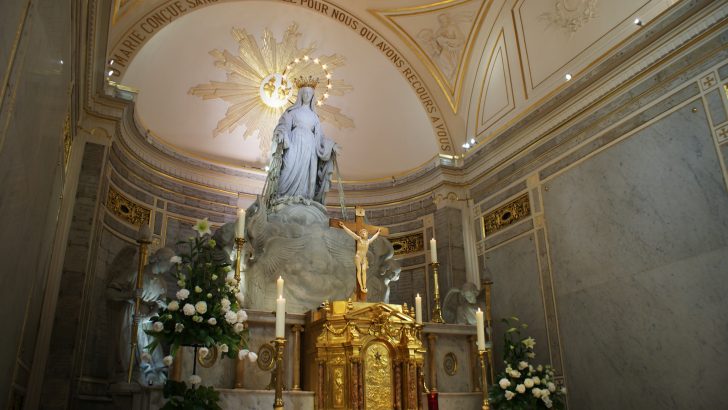A new report issued by the Central Statistics Office claims that Irish Protestants live longer than Irish Catholics – comparing 563 Protestant deaths per 100,000 persons as against 660 Catholic deaths.
One historian, Dr Ida Milne, attributed this trend to Protestants probably having a thriftier and more frugal lifestyle. Protestants see thrift as a virtue – whereas, in my experience, Catholics see it as verging on stinginess.
Dr Milne even suggested that a tradition of frugality means that Protestants scoff up fewer doughnuts!
This is all a bit of a stereotype, surely, and the slightly longer life expectancy of Protestants is probably linked with affluence.
Catholics were often less rich, but more relaxed. He claimed they slept better…”
Poorer people die younger – everywhere. There are probably more poorer Catholics, partly because there are more Catholics, being around 80% of the population. (There was a considerable Protestant working-class, in Dublin especially, 100 years ago – the playwright Sean O’Casey was of this milieu – but the demographics changed with the First World War and the foundation of the Irish State.)
But “there is no new thing under the sun”, and the substance of the CSO’s report could have been taken from the German sociologist Max Weber, who wrote The Protestant Ethic and the Spirit of Capitalism back in 1904.
Weber noted that in Germany and America, Protestants were nearly always richer than Catholics, because of the Calvinist work ethic. They rose early, dedicated themselves to working, didn’t drink or smoke, discouraged “idle pleasures” such as theatre, ostentation, luxury and too much eating.
Catholics, claimed Weber, were more easy-going and happy-go-lucky. They were often less rich, but more relaxed. He claimed Catholics slept better, because they enjoyed life more, while Protestants stayed awake worrying about all those Calvinist working duties.
All stereotypes. But a small tincture of those stereotypes often lingers, because, perhaps there is a grain of truth in their portrayal.
Irish people in general have very good life expectancy on an EU scale. But the inequality between the poorest areas and the most affluent are evident, all the same.
***
I was in Paris last week, where, in honour of my mother, I always try to visit the Chapel of the Miraculous Medal [pictured] at 140 Rue du Bac (Metro: Sevres-Babylone). This beautiful little chapel, site of the apparition of Our Lady to St Catherine Labouré in 1830, is always well-attended by visitors from all over the world, and the adjacent shop which sells books, pictures, rosaries and medals, seems to be continuously busy.
It fascinates me that the Rue du Bac predominantly attracts women worshippers. It is, in the sweetest sense of the word, very feminine, even down to the décor in blue and gold.
I used to joke that my mother liked the location because it was just next to Paris’s oldest department store, Le Bon Marché (founded in 1838), but I see no harm in shopping alongside spirituality. Pilgrimages have always included a spot of shopping. And some of the ladies at the chapel were accompanied by designer carrier bags from the nearby boutiques.
Yet it’s well to remember that Catherine Labouré spent her own life as a nun serving the poor, inspired by St Vincent de Paul.
Privacy is usually the price of a royal lifestyle
Little Archie Sussex, infant son of Harry and Meghan, is to be baptised on July 6 at Windsor Castle’s private chapel – not the public chapel of St George’s, where the couple were married to much fanfare.
If Archie’s grandfather, Charles, Prince of Wales, has any say in the matter, they would be using the traditional Anglican Prayer Book baptismal, which begins: “Dearly beloved, foreasmuch as all men are conceived and born in sin; and that our Saviour Christ saith, none can enter into the kingdom of God, except he be regenerated and born anew of water and of the Holy Ghost…”
It goes on to quiz the godparents on belief and commitment, and administers baptism with avowals that the baptised Christian may have “power and strength…to triumph against the devil, the world and the flesh”.
Quite serious stuff!
We don’t know what form the christening will take – probably an updated version – because Meghan and Harry are insistent that Archie’s life should be private, and a private christening is chosen to shield him from the public gaze.
This has had a bad response, and the old adage of ‘noblesse oblige’ is being invoked: privilege brings responsibilities. If the Duke and Duchess of Sussex are to live in luxury at public expense, then the quid pro quo is that they yield some of their “privacy” and allow the public to see their bambino, and share in Archie’s rites.
Meghan should be familiar with the Hollywood saying: “There’s no such thing as a free lunch.”


 Mary Kenny
Mary Kenny Credits: Official Chapel website
Credits: Official Chapel website 